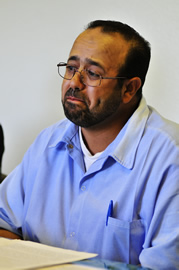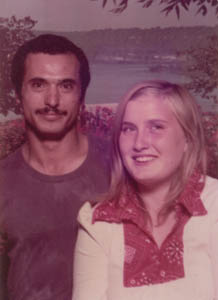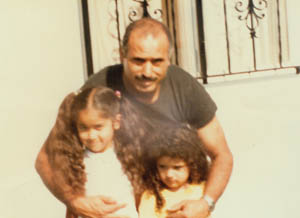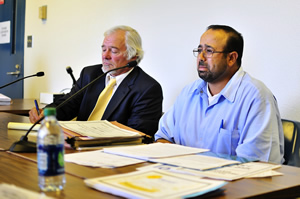by Scott Thomas Anderson and Raheem Hosseini
It was when he saw the girls’ eyes that Hafed Mohamed Thabet realized what he had become.
In the summer of 1993, a then-23-year-old Thabet strutted into a nondescript courtroom 40 miles east of Sacramento to iron out what had spiraled into a gross cultural misunderstanding. Bound by tribal law and propelled by circumstance, Thabet had killed the man who murdered his father and two others in a remote Yemen village two decades earlier.
Surely such retributive justice was permitted in a Christian nation like the United States, Thabet believed—a thought he maintained while stalking his prey cross-country to the foothills of Northern California, as he dispassionately recounted his deed to detectives, and right up until he stepped into that Jackson courthouse like someone with a speeding ticket and a legitimate excuse.
But then Thabet saw the eyes of his victim’s three daughters—sponged with a hurt he knew all too well. It was only then that Thabet realized he wasn’t the hero of his own tale.
“I saw these three little girls looking at me as I was a monster, just like I looked at their father,” he recalls. “I saw what I hated most.”

Days earlier, Thabet gunned down his father’s killer in broad daylight at a gas station in rural Amador County. The scene was a funhouse mirror version of the one that unraveled 19 years prior and 8,000 miles east, where the man named Ahmed Ali Alharsami sprayed bullets into Thabet’s family home over a marriage dispute.
Thabet set out to do what the courts back home permitted, what his culture ordered and what the legal system here apparently refused to do. He avenged his father’s murder and reclaimed honor for his ruined family. Thabet thought he got justice.
Instead, the Yemeni national sealed another bloody link in the chain of honor killings that creates martyrs out of victims and turns survivors into vigilantes.
All these years later—as his nation labors through fierce protests and a precarious revolution—the now 42-year-old Thabet sits before two parole commissioners, trying to articulate the cruel ironies that turned a grieving son into a convicted murderer.
This early September afternoon marks Thabet’s fourth appearance before the California Board of Parole Hearings. For the model prisoner, this room is where the state’s correctional system has proven how arbitrary its proxy court can be. It’s where American justice has blocked a Middle Eastern daughter’s attempts to export forgiveness and peace to a region that desperately needs both. More than that, though, this cramped room inside Mule Creek State Prison is a stage for one actor telling a tale he’s told countless times before.
Thabet has known for a while now that he is not the hero of this incredible tale. But he isn’t its only victim, either.
Slaughter in Yemen
Thabet grew up in Aldakalah, a small village in the Ibb province of western Yemen. Its valley of wells and cisterns is tucked under terraced hillsides that fade from lush teal in the fall to sun-scorched, jagged blisters in the warmer months. Thabet’s family was among the most prominent in the community by virtue of his father, Mohamed, being the village sheik.
In this far-flung settlement of narrow buildings and ancient-faced stone huts—nestled in a divided nation with a feeble, grafting government—Mohamed was mediator and judge to a handful of tribes that looked to him for wisdom. He was Solomon in an isolated valley town that was ever on its own. Respected as he was, though, there was one dispute he wouldn’t be able to calm.
A quiet existence unraveled when Thabet’s older sister, Mahlia, married Ahmed Alharsami, a hot-tempered young man who frequently made sojourns to the United States. As the union progressed, Mahlia revealed to her father that Alharsami was physically abusing her, beating her any time he flew into one of his signature fits of rage. By the time Hafed was four, his older sister had grown worried about Alharsami’s plans to take her with him to the U.S. Mahlia’s father agreed.
“No,” Mohamed told the family about the proposed move, “if he beats her in Yemen, then what will he do to her when she’s farther away from her dad?”
Mahlia moved back home. Her husband seethed. The episode tapped a venomous well inside a man who couldn’t abide refusal.

On Feb. 13, 1974, Alharsami confronted his father-in-law to demand Mahlia’s return. Again he was denied. Alharsami stalked away, but not before leveling an ominous threat at the sheik standing in his path.
The next afternoon, Mohamed sat inside the unfinished home he and a relative were building into the side of a hill. After a long morning toiling on the farm, the sheik sipped tea at a table in the far corner with his cousin and a 60-year-old friend. A few feet away, a 4-year-old Hafed lay on his stomach, playing with a homemade car he assembled from a tin can and shower shoes. Without a word, Alharsami appeared in the open doorway with his hands wrapped around the belly of an AK-47.
The next few seconds were a blur of shouting and the tin-driven drone of 33 smoking bullet shells raining on the floor. In the onslaught, a boy felt his father topple onto him, shielding him from the storm. It was the sheik’s final gift to his son.

United States.
Down the street, Hafed’s mother, Mooriah, was on a rooftop hanging laundry on a clothesline. When an approaching villager shouted out the senseless news, she fainted, plummeting three stories onto the dusty street below.
Despite absorbing more than 20 rounds to his chest and stomach, Hafed’s father didn’t die immediately. That happened eight agonizing hours later, as four men carried him along an unpaved road to a hospital hundreds of miles away. The other two victims, also fathers, perished as well. Hafed’s mother was confined to intensive care with severe back and shoulder injuries. Hafed and his siblings were rushed to a grandparent’s home as gunfights broke out across the village.
Machine guns clamored for their fallen king.
Matters of Honor
In the tube-fluorescent confines of a motel bathroom in Jackson, a 23-year-old Hafed Thabet stared at himself in a wide, anonymous mirror. As manhood settled his features, Thabet was able to see more of the father whose gentle presence he scarcely recalled. But now that Thabet had cut his hair and shaved his mustache, the dead sheik no longer stared back.
After traveling 2,800 westward miles across the cracked plains of America, Thabet altered his appearance for one reason—so that the man he had come for would not realize, until it was too late, that his reckoning had arrived.
It was a long journey to that mirror: In 1974, a Yemeni court convicted Alharsami of triple homicide and sentenced him to death. The ruling, however, was made after the defendant escaped into the vast unknown of the United States. Meanwhile, Thabet’s mother was in and out of hospitals with debilitating back injuries from her fall off the rooftop. With little money coming in, what remained of the Thabet clan dribbled to the bottom of the village’s social and economic castes.
Haunted by residual echoes of gunfire and plagued by culturally driven ridicule, life without a father was particularly hard for Thabet. In a region where gunfire erupted in celebration as often as it did in anger, a jumpy Thabet found himself teased, bullied and left behind during festivals, weddings and other social gatherings.
So when an opportunity to leave home came, Thabet snatched it. In 1991, Thabet temporarily moved to America to earn money for his family back home. He first lived with an aunt and uncle in Watsonville, California, where he stocked store shelves. Unbeknownst to him, Thabet’s aunt harbored secret concerns that Alharsami, who lived just hours away, would discover that the child he failed to kill 18 years earlier was now in California. Thabet was never told Alharsami was near. Instead his aunt encouraged him to stay with his brother in New York.

It was while he was with his brother in New York stocking shelves that members of the insular Yemeni community alerted Thabet his father’s killer was a coast away, enjoying the spoils of a free man. Since at least 1982, relatives of the fallen sheik had petitioned the U.S. to extradite Alharsami back to Yemen, where he would have been put to death. But the government here never responded, leaving the sheik’s family one other option: In Yemen, the law afforded sons the right to mete out the capital punishments its courts could not. Thabet’s culture absolutely demanded it.
Back in Aldakalah, Thabet had witnessed firsthand what became of those who didn’t regain their families’ honor. One local man who elected not to avenge his father’s accidental killing was roundly ostracized and barred from taking a wife. If word reached home that Thabet failed to avenge his father’s murder, an already tortured existence would become unbearable.
Pressure mounted on Thabet to perform his sacred duty. The sheik’s cousins, especially, made their expectations known to the angry young man.
“It’s like the only thing they had was me,” Thabet says through the static whisper of a prison payphone. “I already hated the man for what he did to my father, and they nurtured that. I didn’t need a lot of encouragement, but I got a lot of it from them.”
As Thabet wavered, those around him continued with their machinations. In the coming weeks, he was provided a white, windowless Chevy van singed with orange and yellow stripes, a route to California and a recent photograph of his father’s murderer. A young Yemeni acquaintance named Tamin Hauter, who spent time with the Alharsami family some years earlier, was assigned as his driver.
Thabet met with an immigration attorney to extend his visa and see if there was any way to put off his grim decision. The answer came that he would be back in Yemen within months.
With time officially running out, Thabet bought a 9mm pistol and 38.-caliber revolver from an elderly man in his brother’s apartment complex.
The Hunt
On the opposite coast, unaware of the forces conspiring against him, Alharsami was busy making new enemies. Whipped into an impulsive fury, the now-41-year-old Alharsami strode past the helpless eyes of a young clerk and down the narrow aisles of the general store he used to own, knocking down its goods and spitting on the floor he once mopped.
Alharsami had recently parted with this store in the remote hamlet of West Point in Calaveras County. Overcome by an acute case of seller’s remorse, Alharsami tried to buy back the business he sold to a local Yemeni family. When Rafik Sanad and his uncle rebuffed the offer, an unhinged Alharsami decided to make his counter offer in person.
The Sanads soon learned a lesson that Thabet’s father had discovered at the business end of an automatic rifle 20 years earlier: You don’t just say no to Ahmed Alharsami.
According to investigative documents, Rafik Sanad decided to administer his own lesson soon after.
One month before his death, Alharsami’s neighbors and his fourth wife, Salwa, observed a dark sedan pull up to his West Point home. An unidentified Hispanic male employed by the store exited the vehicle and met Alharsami at his door, telling him he could either leave town or end up dead.
According to Salwa, Rafik Sanad remained in the car, laughing.
Though he downplayed the incident to a concerned neighbor, an already paranoid and frequently armed Alharsami briefly took to wearing a bulletproof vest wherever he went.
In the aftermath of Alharsami’s death, Sanad would begrudgingly acknowledge to a sheriff’s detective a certain degree of “bad blood” between him and the victim. But the tight-lipped Sanad gave up little more and his threatening employee was never found. Back in New York, Thabet’s visa was now weeks from expiration. He and the 19-year-old Hauter shoved off on a grueling cross-country odyssey whose invisible tracks had already been laid.
By Saturday, May 15, 1993, Thabet and Hauter were stopping over in Reno, Nev. Two nights later they arrived at the bland, brick-cobbled motel in Jackson, California, and began making reconnaissance trips to West Point.
They were aided by a young Hispanic male they’d met in an empty schoolyard, whom Hauter would later identify only as “Miguel.” It’s uncertain whether he’s the same man who threatened Alharsami at his door. Miguel guided the amateur hunters directly to Alharsami’s home, pointing out an arterial road that sneaked directly up on its back.
Over the next 48 hours, they stalked their prey from a distance, often sitting for hours in the reeking van that was now overladen with empty cigarette packs and fast food wrappers. During a rendezvous at a grease-gutted diner at the bottom of the mountain, Miguel warned Thabet and Hauter that they were drawing unwanted attention in West Point, a tiny speck of a burg where residents take notice of loitering outsiders. He assured the pair that Alharsami made regular trips to the nearby town of Pine Grove, and directed them to a tidy commercial square where they could prepare their ambush.
One day later, on May 19, 1993, Thabet and Hauter picked up Alharsami’s trail outside a real estate office where Miguel told them to wait, but then lost him along a winding road that branched off the country highway. It had been hours since the duo returned to the small shopping center’s chipped parking lot, hoping for another opportunity.
That Wednesday afternoon, the two amateur hunters waited. Thabet was now only a few months older than Alharsami was in 1974 when he settled his own score. A photo of the man formed a crooked crease in Thabet’s pants pocket. As he passed the passenger-side mirror of their idling van, it wasn’t his face or his father’s that he noted. Lightning had struck. He saw Alharsami.
Eye for an Eye
The setting was as foreign a landscape from Aldakalah as Hafed Thabet could imagine. The 23-year-old glanced at a tire store and then a clawed and battered tin shack with boards on its windows under a hillside swept in pines and incense cedars. Beyond stood a grimy metal Quonset hut operating as a tavern, its sign jutting up from the gravel lot, hoisting a dusty marquee peppered with white Christmas bulbs over a row of impoverished Fords and Chevys.
t was 4:35 p.m., May 19, 1993.
After three hours of waiting, Thabet watched Alharsami pull into the shopping center and stop at a tire store. Unbeknownst to Thabet, at the very moment he was readying his 38.-caliber, Alharsami was hurrying inside to ask owner Pat Carney about the fastest way to Reno. Alharsami’s wife later recalled her husband being strangely restless the night before, waking her with the unexpected announcement he was leaving on a business trip. That was all he told her. Now Alharsami was imploring Carney for the quickest route to the very city Thabet and Hauter had come from three nights earlier. Did the notoriously paranoid fugitive suspect danger?
Whatever purpose was driving Alharsami to head for Nevada, he did something his wife and daughters found unthinkable: He left his guns.
After exiting the tire store, Alharsami moved his vehicle to a gas pump 20 feet away.
Thabet watched Alharsami reposition his truck. The murdered sheik’s son had barely slept. All night he had been haunted by a dead father. Every time he needed guidance, every time he heard his mother weep, every time he caught his sister’s distant stare, every time he heard his cousins taunt, “You’re not a man, you haven’t even avenged your father’s death,” Thabet would quake with unsettled resentments.
Thabet concealed the pistol in his black leather jacket and stepped out of the van. He turned to Hauter. “Leave,” he commanded. “Leave and drive to Modesto. I’ll run toward the houses and escape there.”
Thabet made his way toward Alharsami. Instead of abandoning him, Hauter sped by in the van, accelerating through the Exxon’s service islands and halting at a barren lot west of the pumps. Hauter remained behind the wheel, adjusting his side mirror for a better view of what was to come.
Thabet kept walking. A tiny elementary school across the highway slid through his periphery. The air was warm. Cars milled in and out of a shopping center, idling under faded yellow business signs from the 1970s.

Inside the Exxon, Alharsami urged its owner, Richard King, to tell him the most direct route to Reno. He purchased fuel and went back out to the pumps. In his rush, Alharsami scarcely noticed a young Yemeni man gliding by his back shoulder, heading into the service station he just exited.
Thabet shuffled around inside a moment and then asked for a pack of cigarettes. Pushing his money across the counter to King, he looked through the window at the man who had consumed his thoughts for so long. Did he look like much? With his wavy hair on a balding scalp, his blue polyester shirt and cream-colored shorts, his mismatched belt and striped socks pulled up to his knees?
Alharsami convinced most people in these little mountain towns he was a kindly proprietor who could be seen working in his garden on the weekends, two small children and a German shepherd trailing closely at his heels. Those closest to the man, however, describe a paranoid figure who abused his daughters, intimidated his wives and cultivated multiple feuds within the Yemeni-American community. But Alharsami never forgot the sheik whose life he erased, nor would he have thought twice about taking out additional members of the Thabet clan if he suspected they were near.
“If my father knew [Thabet] was in the country, he would have made sure he was going to be killed by hiring a hitman,” Alharsami’s eldest daughter, Sabah Algazali, later told authorities.
On this particular day, however, a distracted Alharsami was caught off guard.
Thabet willed himself into the descending daylight. The sky lit the blanched red gas pumps as he looked around. An adolescent boy ate candy by the ice machine. A man at the farthest pump lowered soft drinks into the bed of a truck, his wife and child inside the cab. Thabet saw none of them.
Step by step, Thabet watched Alharsami fill his field of vision. The 38.-caliber floated into the air.
Years later, when Thabet was asked how long he’d been waiting for this moment, he would respond, “For all my life.”
Inside the Exxon, King was startled by the explosive crack of a gunshot. He froze. Four more shots followed in rapid succession. He went outside to find Alharsami lying on his side in a fetal position, dressed in a widening cloak of blood.
A gas nozzle dangled from his Toyota.
The Miracle Child
Inside the gray walls of a prison so far from their homeland, Sabah Algazali studied the face of the man she was raised to kill.
Alharsami’s eldest daughter waited a decade before summoning the courage to sit down with her father’s killer in 2003. She had seen Thabet once before, in a Jackson courtroom during a brief preliminary hearing in the days after her father’s death. Algazali knew that the defendant was her mother’s little brother and, thus, her uncle, but it was a name-only relation at the time.
“I had no feeling that he was my blood,” Algazali says of that first star-crossed encounter. “Our intention was to prosecute him and make sure he got life.”
As the old saying goes, be careful what you wish for.
Thabet swallowed a second-degree murder plea that brought with it a 15-years-to-life sentence. Alharsami’s ghost, meanwhile, clamored for the same violent retribution that befell him—a burden that pressed the slight, steady shoulders of a daughter bent on escaping her father’s unforgiving coda.
After growing up with her grandmother in the village of Dahkla, Sabah was summoned by her outlaw father to these shores in 1983. At the age of 10, Alharsami marched his daughter into a swell of sugar beat fields, shoved a gun into her small hands and taught her to direct its flashing muzzle. He told her to be on guard for his enemies, and to avenge him if one succeeded.
“If you ever see one come near me or anything, make sure you protect me and revenge me,” he instructed.
Impressionable Sabah agreed.
By the age of 13, Sabah was carrying her own loaded weapon wherever she went. Instead of attending school, Alharsami had her work the counter of his general store in West Point, selling milk and hard liquor across a cash register she barely cleared. On one occasion, Sabah watched her father violently pummel a customer for trying to pass a counterfeit hundred. She then helped tie the unconscious man up.
From her father’s own lips, Sabah learned of the murders he committed and the retribution he escaped. Alharsami told these stories like folktales, comparing himself to Rambo and demonizing Sabah’s mother in the process. For a long time, Sabah accepted the fiction.
Seven years later, however, everything changed. The 41-year-old Alharsami died beside his truck. His killer went to prison and life trundled on. Years passed, but Sabah couldn’t subdue her curiosity. It was fate that made her the bridge between two complicated killers.
So she launched her own investigation, journeying to the isolated valley town where a scorned husband authored his own death warrant with the rocking cadence of a spitting rifle. From initially reluctant townsfolk, she learned about how that act created a deep schism in the tribal community. Much of the Alharsami clan scattered in shame. The Thabet family never fully healed.
“Both families suffered,” Sabah tells SN&R. “I came back to open the wound.”
While there, Sabah also debunked a tall tale about an 8-month-old being hurled out of a three-story window by those loyal to the murdered sheik. The story went that the infant miraculously survived, was given a new name and smuggled into her grandmother’s care. That little girl was Sabah.
Algazali chuckles now at the fables she believed for so long. Finding out she wasn’t the victim of an attempted infanticide didn’t mean she couldn’t take a lesson from that particular fairy tale, however.
“If I was really a miracle child, I should do something positive,” she decided. “I want to be a hero by saving a life.”
The life she chose to save was her uncle’s.
When she finally came face to face with her dad’s executioner, in 2003, Algazali expected someone like the man who raised her: unrepentant and cold. Instead, looking at her stranger-kin, seated before her with hooded, downcast eyes, Algazali saw a lost soul, a fellow cultural orphan. In short, Sabah Algazali saw herself.
“I know more than anybody [the pressures Hafed felt] because my father always dreamed that I would be the one to revenge for him,” she recounts. “It could’ve been me in prison if I listened to my father.”
But Algazali, who escaped her father’s volatile home at the age of 16, represents the path not taken to a culture that pays blood for blood. She is the miracle child.
It is Sept. 6, 2012, and a little past 1:30 p.m., according to the dragging hands of a wall clock. Inside one of Mule Creek State Prison’s nondescript offices—at the upper reaches of the widest wall that Thabet and his attorney will sit facing—are two identical windows, squished rectangles out of which one can glimpse a cerulean sky shredded by loops of barbed wire.
The image fits. Even the keyhole glimmers of a free world are skewered by the reminders of confinement.
Two long mahogany conference tables have been shoved together to accommodate the dozen or so people that will belly up to inquire, testify, listen and plead on behalf of inmate J-30663, resident of the upper bunk in housing unit 10-235. When the inmate finally enters, escorted by a bulldog-shaped C.O. with a sweet disposition, it’s with a discordant absence of fanfare.
Except for the giveaway prison-issue denims hanging baggily on his sloped frame, Hafed Thabet could be mistaken for anyone other than what he is: A killer. Years of confinement have packed on the stress pounds, scaled back a wavy, sable hairline, and flecked his speech with a subtle NorCal prison drawl. He wears an accountant’s spectacles over sad, inky eyes, and takes pills for acid reflux and cholesterol medication.
Thabet briefly scans the peopled room, politely acknowledges today’s commissioners, and casts a grateful look at his loyal niece.
In short order, the meat of the hearing has arrived.
“My partner and I have about two hours or so to get to know you,” presiding commissioner John Peck says lightly, “so let’s start at the beginning.”
Peck, considered a seasoned pro in the parole game, coaxes the inmate before him to unfurl his life story, confirming that this is the most important tale Thabet will ever tell. For every inmate who walks into this fusty room, a convincing narrative is the only commodity they have to trade. It’s something Thabet has learned through the course of three hearings and seven agonizing, self-scrutinizing years.
In 2005, his first time before this two-person board, commissioners rightly zeroed in on a wobbly retelling of the crime, in which an armed Thabet just happened upon his prey at an upcountry gas station on a summery Wednesday afternoon. In her denial, presiding commissioner Susan Fisher recommended the inmate review his past statements regarding the event. The panel also handed down half the length of a regular denial, giving Thabet hope for a more favorable decision in two short years.
But in 2007, Thabet encountered a board that relied on a dated evaluation by a prison psychologist they acknowledged was unfamiliar with “Islamic issues.” At one point, deputy commissioner Dennis Smith even asked the foreign-born inmate whether he would “be received as a hero” if he were sent back to Yemen. There’s no data on how many natural born killers get asked the same question.
But there again, Thabet played a role in his denial, obfuscating the circumstances that brought him to the petrol-stained plot where he buried a fugitive in bullets.
No, if there’s one date that accurately presents the unrehearsed stage play of American judgment, it’s Sept. 16, 2009, starting at 4:08 p.m. This is the hearing in which Thabet came clean right out the gate, acknowledging the degree to which he plotted Alharsami’s murder to presiding commissioner Hollis Gillingham and deputy Sue Facciola. This is the hearing in which Amador County’s twin legal authorities pointedly rescinded their opposition to Thabet’s release. This is the hearing in which members of the victim’s family, as they had during previous hearings, pleaded for Thabet’s release. This is the hearing in which updated and favorable psychological evaluations, glowing testimonies from an army of vocational instructors and self-help counselors, impeccable parole plans, and too many letters of support to be recorded all came to naught. This is the hearing in which justice was placed tantalizingly out of reach.
That’s not the biased view, by the way. That’s the assessment of someone who has every political reason to oppose Thabet’s release.
“He was denied parole for what I perceived to be the wrong reasons,” says Todd Riebe, elected district attorney of conservative Amador County. “His remorse wasn’t long enough? Remorse is remorse. That’s not even against the law.”
The panel issued Thabet a three-year denial, its longest yet. The basis for that decision became the subject of a petition for review that reached the state Supreme Court, where it was denied.
“They denied him because of his credibility, because he told the truth,” Algazali recounts in disbelief.
At that parole hearing, Algazali stumbled to her feet during the middle of the presiding commissioner’s statement and knocked over a chair on her way to the bathroom, where she got sick. In between heaving groans, she cried and screamed. Her daughter, who’d read her own letter of support, was equally disgusted, telling Algazali she wished she never came.
“He told the truth and got punished for it,” she seethed. “I guess you got to lie in order to live.”
Now, three long years later, Thabet is once again accounting for a life gone wrong. Today’s parole board—Thabet’s fourth in seven years—listens closely as the inmate shares the gritty details of growing up fatherless in an ardently paternalistic society.
“I grew up in a society where you don’t express anger. You don’t express fear. And you can’t laugh too loud because people will think that you have forgotten that your father was murdered,” Thabet says from the very penitentiary where he learned English and picked up a trade.
This panel here before him—created by the state and appointed by favor-doling governors—will decide how good his story is. And Thabet—who has always listened to his God, his culture and his captors—will obey. As he always has.
A Better World
Inside the reconvened conference room somewhere inside Mule Creek State Prison, both Thabet and Algazali are crying uncontrollably.
A short while ago—as she has at every hearing—Algazali offered an impassioned statement on behalf of an uncle she came to know only after he gunned down her father.
Related by blood, enemies according to their culture, the two expatriates grew close over the past decade. For Algazali’s younger sisters and two daughters, Thabet became an unlikely voice of female empowerment, encouraging them to pursue their education, fall in love outside their nationality, and break with their culture’s more restrictive traditions. He spurred them to make the choices he didn’t.
Algazali already has. Rejecting her father’s commands to exact blood for blood, Algazali instead became her uncle’s most tireless advocate, speaking at parole hearings, hiring attorneys and papering every elected official with multiple pleas for assistance, up to an including President Obama.
So far, few have listened.

After delivering a candid testimony about Alharsami’s physical abuses in 2005, the commissioners’ pat delivery of their denial made Algazali feel like the entire day was preordained. At the second hearing, Algazali focused less on her father’s sins and more on her hopes and dreams about bringing peace to a fractured family and its internecine culture. The results were the same. Those around her told Algazali to spare herself the heartache of these wonderland tribunals and stop going.
“You’re just putting fuel in my body,” she replied defiantly.
Rather than give up, the devout Muslim rededicated herself to a cause she says represents her misunderstood religion.
“Islam is about peace, forgiveness,” she tells SN&R, both for Thabet and her father.
“I am paying his debt for God,” she says about the complex Alharsami, a man whose sins she recognizes, yet still the father she loves. “And that’s Islam.”
One of Algazali’s rare victories was convincing Riebe to pen a letter supporting Thabet’s parole. The DA did more than that. At today’s hearing, seated beside Algazali and her sister, he lightly scolds a parole system for botching its duty three years ago. And when it comes time to read his letter, he sets it down and speaks off the cuff instead, saying he should have been there in 2009 to make sure Thabet got his date. He tells the panel this is about more than one man’s freedom. It’s about “drawing a line in the sand.”
“Mr. Thabet and the victim’s family say, ‘No more. Enough is enough. We’re making a stand here to make a better world,’” Riebe testifies. “I think that the best thing that can come of this is that Mr. Thabet get that opportunity.”
Thirty-eight years after his father’s murder, 19 years after Thabet shot down Alharsami and three years since his last parole rejection, the American justice system finally listens.
At 4:05 p.m. on September 6, 2012, the panel agrees to grant Thabet a parole date.
The decision is buried in boilerplate legalese and qualified “if’s”: The governor has until the New Year to make an improbable veto, and Thabet’s release would be immediately followed by ICE detention and likely deportation to Yemen. Thabet has months of anxious waiting ahead.
“I know it happened. People told me it happened. I believe it,” Thabet says from a prison payphone weeks later. “I’m afraid to even be hopeful.”
He has good reason. In recent weeks, he learned of two fellow inmates whose parole dates were overturned by the governor. His case is different, he acknowledges, but what if?
In the conference room where commissioner Peck has just handed down the panel’s decision, none of that yet matters. Uncle and niece lay their heads on the table and empty out the contents of their twinned suffering.
In their patient waiting for state reprieve—and in opposition to the prosaic tribal justice that brought them here—Thabet and Algazali achieved a truer accord. They met outside the rules of law and misappropriated religion, and enacted a pardon that no justice system—be it in the “progressive” West’s or “fanatical” Middle East’s—can counter. It’s the kind of justice that only they can decide to keep.
“I just think for Hafed, his final chapter isn’t written,” Riebe says hopefully. “I think he can make a difference.”
He may just get the chance.
Thabet, who dreams of one day opening an automotive repair shop in his native land, envisions spreading his niece’s message of forgiveness and love back home. But right now the boy from Yemen just wants to see his mother.
From inside the maternity ward of a Stockton hospital 10 days after the hearing, Algazali empathizes. Despite attempts to reconnect as an adult, this family saga left Algazali estranged from her own mom, Thabet’s sister. At this moment, though, Algazali can only count the blessings.
“I feel like a newborn person. I feel like I’m alive,” she effuses.
The 39-year-old should know from newborns. Her grandson Khalil just entered a world with infant peace in his family but stubborn, flaring conflict in his young grandmother’s homeland.
It’s a start.
Scott Thomas Anderson is also the writer-producer of the true crime podcast series ‘Trace of the Devastation’


Be the first to comment on "Murder in the Foothills"